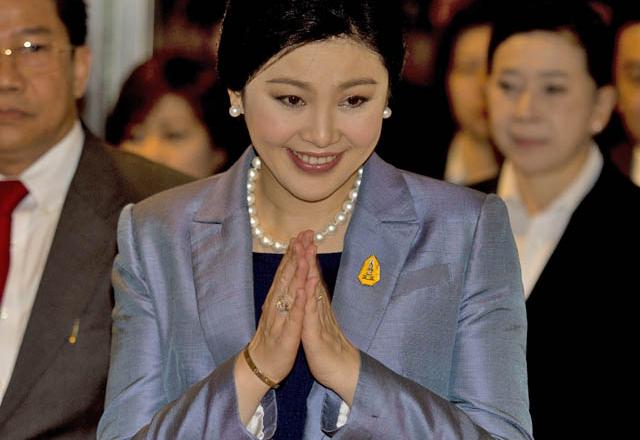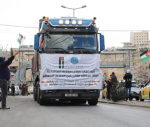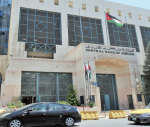You are here
Thailand to end state of emergency as demonstrations ease in Bangkok
By AFP - Mar 18,2014 - Last updated at Mar 18,2014
BANGKOK — Thailand announced Tuesday the end of a nearly two-month-old state of emergency in Bangkok and surrounding areas, hoping to lure back foreign visitors following an easing of deadly political protests.
The use of emergency rule dealt a heavy blow to Thailand’s key tourism industry during what is usually peak season, and also raised fears of a drop in foreign investment.
The state of emergency will be replaced by another special law, the Internal Security Act, with effect from Wednesday until April 30, Prime Minister Yingluck Shinawatra’s office announced.
“We’re confident that we can handle the situation so the Cabinet agreed to revoke the state of emergency as requested by many parties,” Yingluck told reporters.
“The cancellation is to build confidence in the economy and the tourism sector,” she said.
Thailand’s international tourist arrivals were down roughly 8 per cent last month from a year earlier, with Bangkok’s airports seeing a drop of more than 18 per cent in total, according to official figures.
Yingluck has faced more than four months of political protests aimed at ousting her elected government and installing an unelected “people’s council” to oversee reforms.
The state of emergency was introduced in the run-up to a February 2 general election called by the premier in an unsuccessful attempt to calm the crisis.
Political bloodshed, often targeting protesters, has left 23 people dead and hundreds wounded in recent months, including in grenade attacks and shootings.
However, attendance at the demonstrations has fallen sharply in recent weeks, while the introduction of emergency rule failed to prevent protesters disrupting the February election.
The demonstrators late last month moved to scale back their rallies, consolidating at one site in Bangkok’s Lumpini Park as they ended their so-called “Bangkok shutdown”, which had seen them occupy key road intersections in the city.
Thailand has been periodically rocked by mass demonstrations staged by rival protest groups since a military coup in 2006 that ousted then-premier Thaksin Shinawatra — Yingluck’s brother.
Her opponents say she is a puppet for Thaksin, a billionaire tycoon-turned-politician, who fled overseas in 2008 to avoid jail for a corruption conviction.
The February election has not been completed in some areas because of disruption by the protests, leaving Yingluck’s government in a caretaker role with limited powers.
Pro-Thaksin parties won every previous election for more than a decade, helped by strong support in the northern half of the kingdom.
But many southerners and Bangkok residents accuse the Shinawatra family of using taxpayers’ money to buy the loyalty of rural voters through populist policies.
The authorities were unable to use the security powers offered by the state of emergency in any case, after a civil court last month ordered the government not to use regulations issued under the decree.
The court banned the use of force against the protesters, after attempts by riot police to clear areas occupied for weeks by opposition demonstrators sparked deadly clashes.
Yingluck has suffered a series of legal defeats by the courts, which have been accused by government supporters of colluding with the opposition to try to oust the premier.
Yingluck also faces negligence charges that could lead to her removal from office, linked to a flagship rice farm subsidy scheme that her critics say is riddled with corruption.
Thailand’s central bank last week reduced its official interest rate to 2 per cent, the lowest level in three years, warning that risks to economic growth had risen in the wake of the political crisis.
The Southeast Asian nation has been dubbed “Teflon Thailand” for its ability to recover quickly from numerous economic setbacks including political violence.
Dozens of foreign governments issued travel warnings in response to the latest round of turmoil, with tourists advised to avoid protest sites and take extra care in Bangkok.
Thailand’s tourism sector needs about three months to bounce back following the lifting of emergency rule, according to the Tourism Council of Thailand.
Related Articles
A Thai court ordered Prime Minister Yingluck Shinawatra to step down on Wednesday after finding her guilty of abusing her power, prolonging a political crisis that has led to violent protests and brought the economy close to recession.
Thailand’s embattled premier will be charged with neglect of duty, anti-graft officials said Tuesday, as clashes between police and opposition protesters left four dead, and dozens wounded in central Bangkok.
Thailand’s constitutional court said it will rule on Wednesday whether to remove Prime Minister Yingluck Shinawatra from office on abuse of power charges, a verdict that could plunge the country deeper into crisis.
















